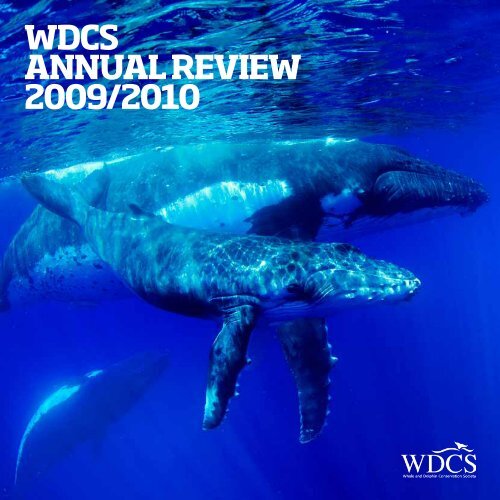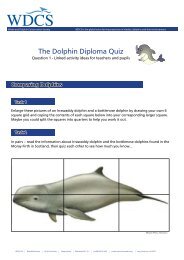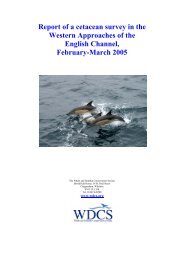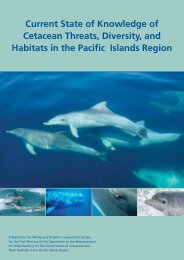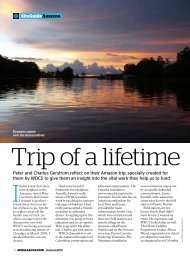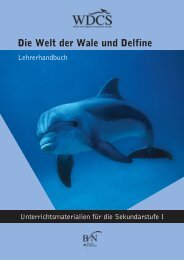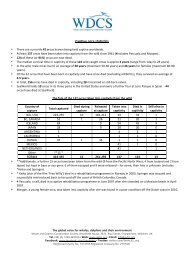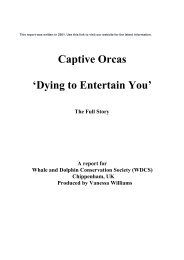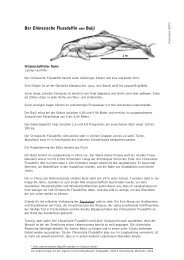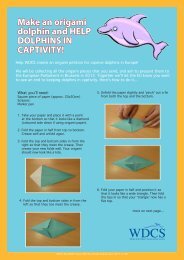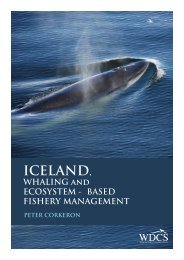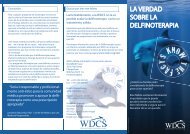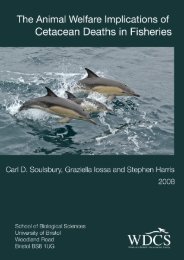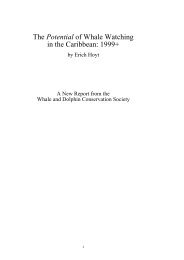wdcs annual review 2009/2010 - Whale and Dolphin Conservation ...
wdcs annual review 2009/2010 - Whale and Dolphin Conservation ...
wdcs annual review 2009/2010 - Whale and Dolphin Conservation ...
You also want an ePaper? Increase the reach of your titles
YUMPU automatically turns print PDFs into web optimized ePapers that Google loves.
WELCOMEWelcome to the <strong>2009</strong>/<strong>2010</strong> WDCSAnnual Review. As a patron of the charityI have been proud to find myself workingalongside such positive, active staff,supporters <strong>and</strong> volunteers, without whomnone of the last 12 months’ achievementswould have been possible.Perhaps like me you’ve taken part inan athletic pursuit to raise funds – I planto run the 2011 London Marathon forWDCS, my second venture of this ilk –but whatever you’ve done to support theorganisation, I thank you.I had the pleasure of working withWDCS recently on Monty Halls’ GreatHebridean Escape. In my quest to becomea wildlife ranger on some remote Scottishisl<strong>and</strong>s I got the support of the WDCShead of Scottish policy, Sarah Dolman, <strong>and</strong>international projects coordinator, NicolaHodgins, who braved the elements with me.We were able to highlight the exciting, newWDCS Shorewatch initiative during theshow; let’s hope that this leads to furtherrecognition of the organisation’s work,allowing us to engage with new supporters<strong>and</strong> volunteers, in turn helping to save <strong>and</strong>protect these beautiful creatures.Monty Halls,WDCS patron, marine biologist<strong>and</strong> TV presenter
Insideyour<strong>review</strong>COVER: douglas j hoffman4The year in <strong>review</strong> by WDCSchief executive, Chris Butler-StroudWhat’s so special about whales6 <strong>and</strong> dolphins?How WDCS fights the fight8 against whalingProtection of the UK’s dolphins is10 of paramount importanceThe battle against the injustices12 of captivity continuesWDCS’s protection programmes14 for river dolphinsCreating homes for whales <strong>and</strong>16 dolphins around the worldSetting responsible st<strong>and</strong>ards for17 whale <strong>and</strong> dolphin watching18Thank you to all our loyalsupporters for your helpthroughout the yearAn overview of the results of the19 last financial yearContact details, <strong>and</strong> a list of key20 supportersWDCS 3
Tough TimesAheadAs the global voice for whales <strong>and</strong>dolphins, during <strong>2009</strong> <strong>and</strong> the startof <strong>2010</strong>, WDCS has achieved somegreat things. However, we could nothave done any of it without yoursupport. There are many challengesahead of us, <strong>and</strong> the successes youwill read about in this Review giveus hope for the future. But in hardeconomic times, we need yoursupport more than ever.The WDCS Protect Our <strong>Dolphin</strong>scampaign in Scotl<strong>and</strong> has achievedsome notable successes: keepingNATO military exercises out ofthe Moray Firth; limiting marinadevelopments <strong>and</strong> preventingthe exploration for oil <strong>and</strong> gas inwhat is a European Protected Areadesignated specifically to protectthe charismatic but vulnerabledolphins of the Moray Firth. Wecontinue to fight on all these frontsas the battle to gain real <strong>and</strong> lastingChris Butler-StroudWDCS chief executiveprotection for these amazing animalsis an ongoing one.WDCS is also continuing to developimportant education <strong>and</strong> conservationprojects around the world, includingreaching even more children throughour education work in Scotl<strong>and</strong>,exp<strong>and</strong>ing our Pier2Pier <strong>and</strong> <strong>Dolphin</strong>Diploma initiatives to areas such asHaiti, educating the public about drivehunts in the US, <strong>and</strong> developing aJapanese website for children.I’m proud to say that with yoursupport we have campaignedsuccessfully to keep the currentcommercial whaling ban in place.However, some nations continueto kill whales <strong>and</strong> the frighteningprospect of the ban being liftedremains a very real one.There are tough times ahead buttogether we can make the world’soceans <strong>and</strong> rivers a safer place forthese remarkable animals.Clockwise from top, shutterstock, james cockayne, charlie phillips, <strong>wdcs</strong>/alice pope, gill braulikWDCS continues to fight for real<strong>and</strong> lasting protection for theseamazing animals4 WDCS
James Cockayne ran the Readinghalf-marathon to raise funds forWDCSBottlenose dolphin in Scotl<strong>and</strong>Looking out for dolphins atWDCS’s Wildlife CentreRiverdolphinrescue
WDCS is dedicated toprotecting whales <strong>and</strong>dolphins in the placesthey call ‘home’Clockwise from top:sperm whale, beluga whale,humpback whale6 WDCS
Why <strong>Whale</strong>s <strong>and</strong><strong>Dolphin</strong>s?WDCS is well known in many parts of the world for its strong stance on conservation issues <strong>and</strong>for its dedication to protecting whale <strong>and</strong> dolphin species in the places that they call ‘home’. Butwhy do we protect these fascinating animals? What is it that inspires awe, appreciation <strong>and</strong> adesire to help them?cherylle millard-dawe, miguel iniguez, shutterstock, mark votierPart of our work is focused on exploring theethical, conservation <strong>and</strong> welfare argumentsfor protecting whales <strong>and</strong> dolphins. There isso much more to be discovered about theirsecret social lives, but we already know thatcertain dolphins play specific roles withintheir own communities; that informationcan be passed between individuals of thesame species <strong>and</strong> sometimes betweengenerations, a process that many scientistsnow recognise as ‘non-human culture’. Wealso know that some species possess specialbrain cells normally associated with empathy<strong>and</strong> emotional intelligence. These cells werepreviously thought only to be found in thebrains of humans <strong>and</strong> other primates. Wealso know that some dolphins use tools toforage for food.These discoveries bring the continuingslaughter <strong>and</strong> exploitation of whales <strong>and</strong>dolphins into even sharper focus, <strong>and</strong> make ourrole as guardians of the interests of these uniquebeings even more important. After 60 yearsof research, there remains no humane way tokill a whale or dolphin at sea, no effective wayof guaranteeing whaling nations’ compliancewith regulations, <strong>and</strong> no scientific certaintythat whale populations can withst<strong>and</strong> huntingin the face of growing environmental threats.With your help, WDCS will continue tofund research that enables us to discovermore about whale <strong>and</strong> dolphin culture <strong>and</strong>intelligence, <strong>and</strong> we will use this learning toensure that these intelligent creatures, withwhom we share our planet, are given theprotection that they deserve.The continuing slaughter of whales <strong>and</strong> dolphins makes our role as guardians of these unique beings even more importantDid you know...whales <strong>and</strong> dolphinsreally are amazingn The sperm whale is the deepest diver.n The Indo-Pacific humpback dolphinhas the best hearing.n Bowhead whales live the longest –possibly reaching the age of 200.n The heart of a blue whale weighs up to1,000 pounds, <strong>and</strong> its aorta, the majorblood vessel for the heart, is big enoughfor a small-sized human to crawl through.The heart is about the size of a VW Beetle.n Learn more about whales <strong>and</strong> dolphinsby visiting our online Species Guidewww.<strong>wdcs</strong>.org/speciesWDCS 7
Aximi, ommoluptatibusdaevoluptat lautut dolupturmodisquamusam ipsam, sequomodita quatusOur aim is to act againstcommercial whaling inall its guises8 WDCS
Stop WhalingDespite a ban, Norway <strong>and</strong> Icel<strong>and</strong> kill over 2,000 whales each year between them <strong>and</strong> areexp<strong>and</strong>ing their international trade in whale products. Our aim is to exert political <strong>and</strong> publicpressure to bring an end to all commercial whaling for good.ikan, WDCSSuccessesn WDCS helped maintain the ban oninternational commercial whaling <strong>and</strong>trade in whale products, persuadinggovernments <strong>and</strong> influential organisationsthat this important ban should remainin place. Working with independenteconomists, WDCS produced the first evercomprehensive analysis of the economicsof whaling in Japan <strong>and</strong> Norway, revealingthat vast public subsidies are underwritinga financially unsustainable industry in bothcountries.n Climate change is one of the biggestthreats facing whales <strong>and</strong> dolphins today,with changes in sea temperature, fresheningof seawater, rising sea levels, loss of icy polarhabitats <strong>and</strong> the decline of food sourcestaking place so rapidly that some whale <strong>and</strong>dolphin populations may be unable to adapt.WDCS was instrumental in securing aresolution at the <strong>2009</strong> <strong>annual</strong> meeting of theInternational Whaling Commission (IWC),making the IWC’s work on the effects ofclimate change on whales <strong>and</strong> dolphins apriority.n WDCS joined forces with Sea Life inearly <strong>2009</strong> to oppose moves for a return oflegalised commercial whaling. Visitors toSea Life’s 31 centres around the worldsigned more than 100,000 Stop Whalingpostcards for delivery to the EU calling onMember States to stop whaling. In November<strong>2009</strong>, together with SEA LIFE we launched aunique event: the Junior <strong>Whale</strong> Conference.The two-day event, held at the Alton TowersResort, saw delegates from nine schoolsacross the UK debate the controversialwhaling issue. Our very enthusiastic youngconservationists were given the chance tofind out more about the history of whaling<strong>and</strong> the politics <strong>and</strong> ethics behind the currentwhaling debate. WDCS is represented at theIWC each year, <strong>and</strong> some of the arguments<strong>and</strong> views expressed by these youngstershelped us to develop our own arguments <strong>and</strong>lend extra weight to them.HOW YOU HELPEDn Your support for our first Walk for <strong>Whale</strong>sin July <strong>2009</strong> raised vital funds for our StopWhaling campaign. In partnership withSea Life we held 11 walks around the UK,<strong>and</strong> you turned out in your hundreds. SomeSupporters ‘walking for whales’; Mir<strong>and</strong>a Krestovnikoff prepares toabseil; young people in debate at the Junior Whaling Conferencewalkers were as young as four <strong>and</strong> manytravelled hundreds of miles to take part.The money raised helped ensure that ourexperts were at the International WhalingCommission intercessional meetings to fightproposed plans to allow Greenl<strong>and</strong> to furtherincrease the number of humpback whales ithunts <strong>and</strong> kills each year.n Another great success was our Abseil forthe <strong>Whale</strong> that saw supporters abseil 100feet down Bristol’s Avon Gorge as part of ourcampaign to bring an end to commercialwhaling. WDCS patron <strong>and</strong> TV presenter,Mir<strong>and</strong>a Krestovnikoff, together with someof our amazing supporters <strong>and</strong> representativesfrom local business, went ‘over the edge’to raise funds. This money will enable thecontinuation of vital research into how thewhaling nations are using the oil <strong>and</strong> meatfrom the whales they kill as well as more directaction against commercial whaling.WDCS 9
<strong>Dolphin</strong>s are a muchlovedpart of Scotl<strong>and</strong>’snatural heritageWe are hopefulthat the newMarine Act forScotl<strong>and</strong> willoffer additionalprotection tobottlenosedolphins – <strong>and</strong>all whales<strong>and</strong> dolphins– throughoutScotl<strong>and</strong>10 WDCS
Protect Our <strong>Dolphin</strong>sThe dolphins of the Moray Firth are an amazing group of animals <strong>and</strong> a much loved part of Scotl<strong>and</strong>’snatural heritage. But they are also vulnerable. Our Protect Our <strong>Dolphin</strong>s campaign aims to ensure thatthese animals have a future by helping to strengthen their legal protection, by seeking to regulateindustries that threaten their environment <strong>and</strong> by changing the way we behave around them.Successesn We were successful in stopping seismicsurveys for oil <strong>and</strong> gas in the Moray Firth,while more research is being undertaken toassess the risks of this.n We made the Ministry of Defence awareof the level of protection of the bottlenosedolphins, <strong>and</strong> as a result they reconsideredconducting part of the military exercise JointWarrior in the Moray Firth.n We provided important expertise to astudy into the economics of the Moray Firthdolphins. Demonstrating how much thesespecial animals bring to Scotl<strong>and</strong>’s economywill help us gain support for protecting them.n We continued our support of a responsibledolphin watching industry through the<strong>Dolphin</strong> Space Programme.n We were successful in achieving a newMarine Act for Scotl<strong>and</strong> – which we areworking hard to ensure will offer additionalprotection to the bottlenose dolphins <strong>and</strong> allwhales <strong>and</strong> dolphins throughout Scotl<strong>and</strong>.HOW YOU HELPEDn Many of you have been getting out to theScottish coastline to look out for whales <strong>and</strong>dolphins through the WDCS Shorewatchinitiative. You have collected importantdata which helps us to underst<strong>and</strong> moreabout where these animals are. The morewe underst<strong>and</strong>, the better protection we canprovide, <strong>and</strong> we hope that Shorewatch will gofrom strength to strength in the coming years.n During the year 60,000 visitors passedthrough the doors of the WDCS WildlifeCentre at Spey Bay <strong>and</strong> a further 20,000 cameto the WDCS <strong>Dolphin</strong> <strong>and</strong> Seal Centre atNorth Kessock. In addition, we welcomed alarge number of school <strong>and</strong> university visitsto our new education room at the WDCSWildlife Centre where we were able to engage1,490 conservationists of the future with theissues facing their local dolphins. This greatspace was kindly funded by Scottish NationalHeritage, The Baxters Foundation <strong>and</strong>Moray Leader. And your generosity generatedaround £90,000 in revenue from the shopsat both Centres <strong>and</strong> also through your kinddonations. Thank you.n Meanwhile, WDCS patron <strong>and</strong> TVpresenter Monty Halls bravely took on thegruelling London Marathon <strong>and</strong> with thehelp of WDCS supporters he raised £9,500for the campaign.WDCS/charlie phillipsVisitors at the WDCS <strong>Dolphin</strong> <strong>and</strong> Seal Centre at North Kessock; WDCS continues the fight against oil <strong>and</strong> gas surveys in potentially sensitive areas;Monty Halls (in dolphin suit) runs the London Marathon for WDCSWDCS 11
12 WDCSOur supporters have beenhighly vocal in speakingout against captivity
Anti CaptivityWDCS underst<strong>and</strong>s why people love whales <strong>and</strong> dolphins <strong>and</strong> their desire to see them up-close, butkeeping them in captivity inflicts cruelty <strong>and</strong> suffering. These wide-ranging, social animals are forcedto live in confined spaces <strong>and</strong> suffer lower life expectancy <strong>and</strong> higher infant mortality than in the wild.WDCS is working for a world where whales <strong>and</strong> dolphins are no longer subjected to this cruelty.Successesn Germany After the devastatingnews of six bottlenose dolphins dying inone year at Nuremburg Zoo, WDCS wonan important legal battle against the Cityof Nuremburg to grant us full access toinformation relating to the conditions of thedolphins kept at the zoo. The informationobtained will enable us to conduct anindependent <strong>review</strong> of dolphin deaths there.We hope this will stop similar tragedies inother facilities in Europe.n Austria Following reports that a newdolphinarium was being proposed in Austria,we conducted a nationwide media campaignto expose the cruelty of live captures, trade<strong>and</strong> confinement. As a result, the responsibleAustrian Ministry publicly stated that thedolphinarium project will not go ahead.n Croatia In response to the guidance<strong>and</strong> information provided by WDCS relatingto whales <strong>and</strong> dolphins in captivity, Croatiahas now made it illegal to keep dolphins incaptivity for commercial exploitation.n USA We have made strongrecommendations to the US Governmentregarding the public display of whales <strong>and</strong>dolphins to strengthen the regulations formarine parks <strong>and</strong> aquaria under the US MarineMammal Protection Act.n plus We supported <strong>and</strong> helped promotethe international release of The Cove, adocumentary detailing the inhumane drivehunts in Japan, which won the Oscar forBest Documentary in March, <strong>2010</strong>. We alsoparticipated in the Dominican Republic FilmFestival as a panel expert.HOW YOU HELPEDn We’re proud to see a number of youngersupporters coming on board to help ourcampaigns, leaving us feeling positive thattoday’s children are becoming more aware ofconservation <strong>and</strong> wildlife issues.n Talented students at the Leesburg HighSchool in Florida, USA wrote <strong>and</strong> performeda powerful rap, which can be seen on YouTube.The students are now working with WDCSto arrange a trip to OrcaLab, the home ofWDCS’s adoption orcas in British Columbia.n In Geneva, Switzerl<strong>and</strong>, 11-year-oldstudent, Jack Davis wrote a report <strong>and</strong>produced a sculpture to demonstrate hisfeelings about orcas in captivity. For his lastfew birthdays he has asked for donations toWDCS instead of presents!shutterstock, jamie aquinoFace to face with a captive orca; Florida rappers bring the message home; The Cove, an Oscar-winning documentary on drive huntsWDCS 13
Workingalongside localcommunitieswe haveimplementedprotectionmeasures for riverdolphinsWDCS is championing aglobal campaign to save thesurviving river dolphins14 WDCS
River dolphinsThe river dolphins found in South America <strong>and</strong> Asia are among the most endangered mammals inthe world. We have recently lost one species forever (the baiji) <strong>and</strong> the few surviving species, like theAmazon river dolphin, are under threat. WDCS works to support conservation projects <strong>and</strong> researchto help the animals <strong>and</strong> their habitats, <strong>and</strong> also the local communities who live alongside them.Successesn In partnership with a local conservationfoundation, Natütama, WDCS has developeda successful model for working with Amazonindigenous communties in Colombia, toprotect river dolphins <strong>and</strong> local wildlife.Central to this work is the interpretationcentre in Puerto Nariño, which providesjobs <strong>and</strong> an important focal point for visitors<strong>and</strong> local communities, <strong>and</strong> which has seenthous<strong>and</strong>s of visitors walk through its doors inthe past year. We aim to roll out this type ofproject to other Amazon countries.n WDCS continues to help work with localchildren through a dedicated, year-roundeducation programme in schools (<strong>and</strong> anecology club at weekends), to communicate<strong>and</strong> promote key conservation messages <strong>and</strong>to ensure local knowledge about wildlifeconservation is not lost.n WDCS continued its efforts to helpcommunities set up alternative livelihoodsthat don’t impact on the dolphinpopulations. This includes helping agroup of Ticuna women in a new ventureto recover the value of fish caught byfishermen, but damaged by predators suchas dolphins. The cooperative processes themeat to make fish burgers. The fishermenget better value for the fish <strong>and</strong> indigenousfamily incomes are enhanced.HOW YOU HELPEDn Thanks to your support, WDCS is alsoable to fund a conservation programme inPuerto Nariño to protect river dolphins <strong>and</strong>their habitats. Local wildlife guardians carryout regular surveys in the area <strong>and</strong> reportany problems so that they can be dealt withby the team. Working alongside the localTicuna community, we have implementedprotection measures for river dolphins <strong>and</strong>associated endangered species.Fern<strong>and</strong>o Trujillo, Sarita Kendall/WDCSThe Natütama centre protects river dolphins; education of the young is so important; children can demonstrate their knowledge with a diplomaWDCS 15
Creating homesfor whales12 by 12WDCS’s goal isto help design<strong>and</strong> create 12safe havens forwhales <strong>and</strong>dolphins by2012Around the world, there aremany key marine areas that arecritical as homes for whales<strong>and</strong> dolphins, <strong>and</strong> others thatare key migratory routes.Successesn WDCS is committed to protecting theplaces where whales <strong>and</strong> dolphins live toensure their future. WDCS’s goal is to helpdesign <strong>and</strong> create 12 large ‘safe havens’ orMarine Protected Areas (MPAs) for whales<strong>and</strong> dolphins by 2012.n In particular WDCS has been working aspart of the Save Our Marine Life coalitiontowards a network of Marine ProtectedAreas in the west of Australia that will be asafe haven for whales <strong>and</strong> dolphins.douglas j hoffman16 WDCS
Responsible whale& dolphin watchingWDCS does not want to denypeople the great pleasure ofwatching whales <strong>and</strong> dolphinsat sea, but is committed toensuring that this increasinglypopular pastime is managedwith minimal disturbance tothe animals themselvesSuccessesn WDCS has developed <strong>Whale</strong> SENSE,a responsible whale watching programmeto protect whales <strong>and</strong> increase outreach topassengers.n This year has also seen the expansionof our <strong>Dolphin</strong> SMART programme tothe western coastline of Florida, withparticipating vessel operators now inAlabama, Florida <strong>and</strong>, in the near future,Hawaii.n We have exp<strong>and</strong>ed our youth whale <strong>and</strong>dolphin awareness programme, Pier2Pier,<strong>and</strong> <strong>Dolphin</strong> Diploma programmes to Haitithrough our continuing development of aneducation, research <strong>and</strong> ecotourism projectin the country, promoting marine mammalprotection <strong>and</strong> sustainable tourism.WDCS iscommittedto ensuringthat whalewatchingdoes notdisturb thewhalesWDCS 17
A SPECIAL THANK YOUWe are extremely grateful to you, oursupporters, adopters <strong>and</strong> members. Yourpassion <strong>and</strong> commitment will help us tofight the continuing threats to whales <strong>and</strong>dolphins around the world to ensure not onlytheir survival, but also that they thrive inoceans <strong>and</strong> rivers for many years to come.We thank you all.Clockwise from top left; WDCS’s first gala dinner raised an astonishing £20,000 for whales <strong>and</strong> dolphins, Walking for <strong>Whale</strong>s, over the edge in Bristol,Whacky <strong>Whale</strong> Race fundraising event, London walkers, beach clean up.18 WDCS
Review ofFinancial ResultsTo deliver charitable objectives ofcampaigning, conservation <strong>and</strong> education,WDCS made charitable expenditure of over£2.9 million to the end of <strong>2009</strong>.Although WDCS felt the effects of therecession, close financial managementmeant that the organisation was able tomatch spending to income levels <strong>and</strong>generate a consolidated net income of£116k for the year, which we hope will helpthe charity weather the current economicdifficulties.The information in the chart oppositehas been extracted from the audited,consolidated accounts for the charityfor the year ended 30 September <strong>2009</strong>.A copy of the full consolidated accounts– audited by Chantrey Vellacott – theirreport <strong>and</strong> the report of the Trustees canbe obtained from:How each £ was spent in 2008–09<strong>Conservation</strong> <strong>and</strong> campaigns 59.0%Governance 0.3%Donations 2.0%Trading, management <strong>and</strong> administration 3.4%Information <strong>and</strong> education 4.8%Membership <strong>and</strong> adoption programmes 9.8%Fundraising 20.7%Company Secretary,WDCS,Brookfield House,38 St Paul Street,Chippenham,WiltshireSN15 1LJscott portelliWDCS 19
Get in touchTo find out more about WDCS, <strong>and</strong> how to support us,please contact info@<strong>wdcs</strong>.org or 01249 449 500, or visit www.<strong>wdcs</strong>.orglucy mollesonWDCS would like to thankthe following corporateorganisations:EndsleighSea LifeProfile Technology Services LtdBenromachKonfidenceTarget DryHunter Hall International LtdAnd the following Trusts<strong>and</strong> Foundations:The Simon Gibson Charitable TrustBBC Wildlife FundThe Stella Symons Charitable TrustThe Joyce Carter Charitable TrustScottish Natural HeritageThe Michael Harry Sacher Charitable TrustThe Jeremy & John Sacher Charitable TrustThe Moray Firth PartnershipThe Panton TrustThe Kilverstone Wildlife Charitable TrustThe Maud Beattie Murchie Charitable FundThe Anne Brown Charities SettlementSusan H Guy Charitable TrustProject AWARE FoundationThe TowerBrook FoundationGlobal OceanHDH WillsKnowledge Transfer PartnershipWhitely Fund for NatureGala dinner thanks:La Prairie Advanced Marine Biology skincareFujiFilm UKLeon Norell LtdAlgaranDouglas Hoffman Underwater PhotographySea SirenThe SanctuaryWildlife WorldwideIgloo FlowersDave KingSouthern Right WinesGala Dinner Event CommitteeCherylle Millard-DaweCarina CoenCharlie DuffAngela RaperRon Watsonn We would also like to say an extra special thankyou to those individuals <strong>and</strong> families that havechosen to support WDCS’s work through legacydonations or in memory of their loved ones.


